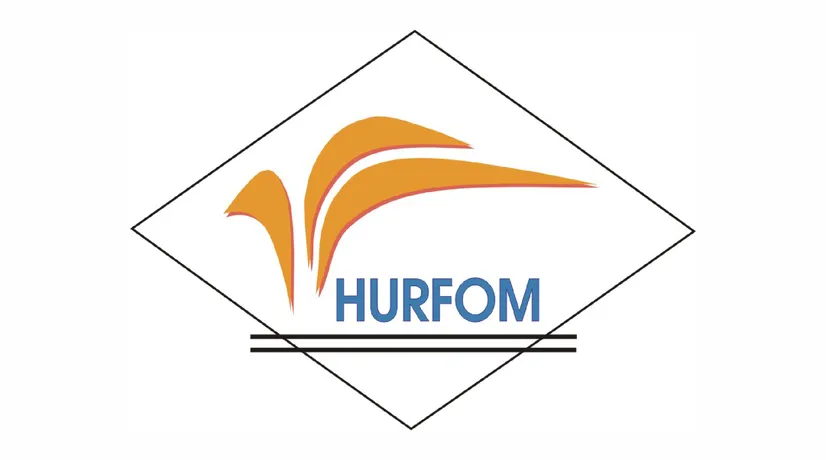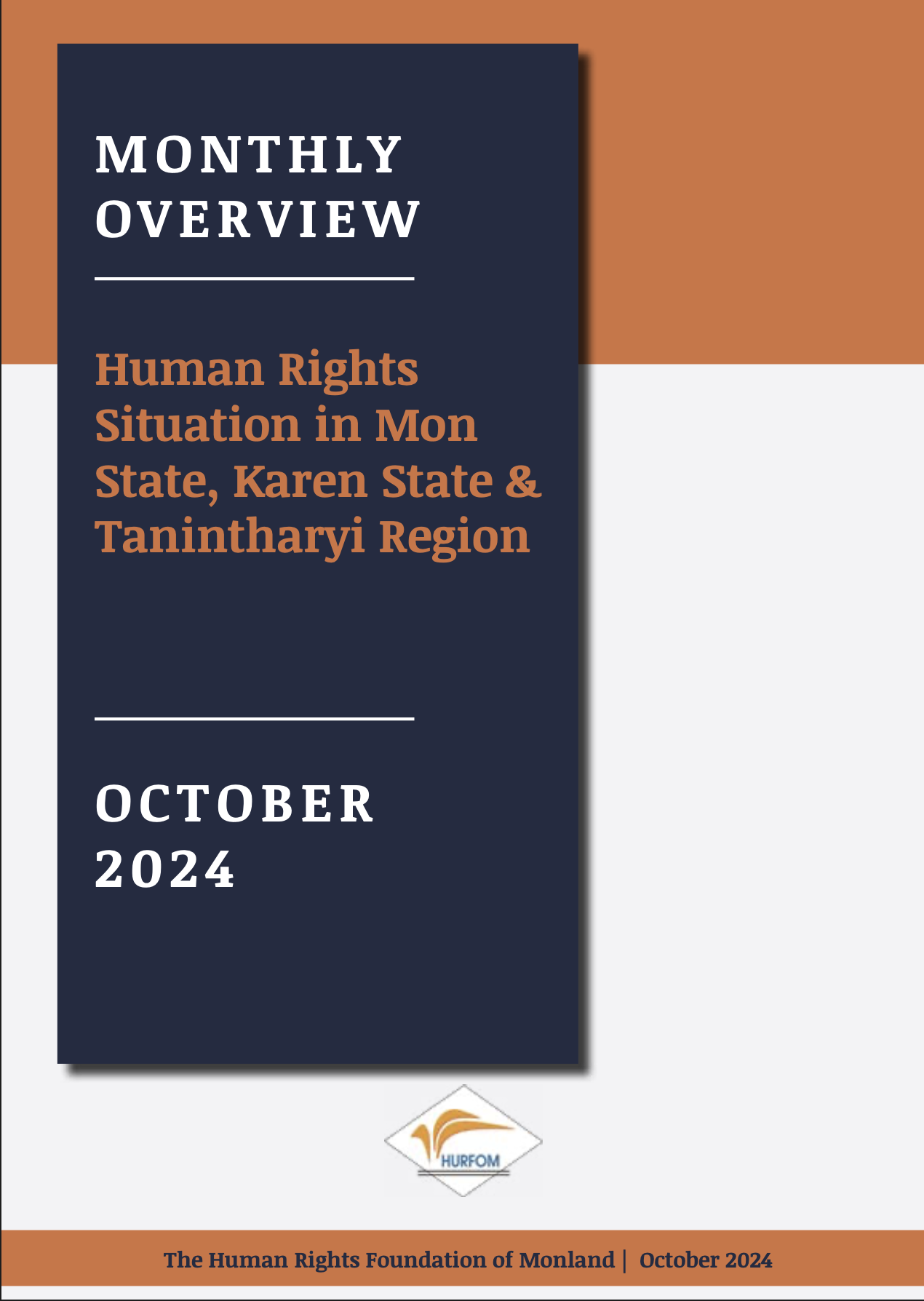October 2024: Monthly Overview of the Human Rights Situation
04 November 2024


Summary overview and analysis
Surveillance on the Rise in Southeastern Burma as Civilians Seek Safety and Protection from Ongoing Atrocities by the Military Junta
Human rights violations across southeastern Burma continue to cause distress and alarm among local civilians. In targeted areas of the Human Rights Foundation of Monland (HURFOM), including Mon State, Karen State, and the Tanintharyi region, local people increasingly face restrictions on their ability to travel and work freely, with multiple forms of extortion imposed for permits. This extends to the epidemic of arbitrary arrests, which undermines civilian rights and freedoms.
In addition, the junta-enforced census, which began in mid-October, poses several risks to local security. For example, the census includes a controversial question about the language spoken at home instead of directly asking about ethnicity. This has led to fears that ethnic minorities who respond by saying they speak Burmese at home will automatically be classified as “Burmese” in the census, undermining their ethnic identity.
In the last census, the Mon ethnic population accounted for over one million. However, given the format of this new census, some worry that the Mon population could drop below one million because many, particularly those in urban areas or certain villages, predominantly speak Burmese at home. Critics say this concern reflects the junta’s broader political strategy of diluting ethnic representation and influence in the country.
Experts believe this census format could systematically downplay ethnic populations, using a model inspired by the methods employed in China and Russia to target ethnic minorities. This manipulation could threaten the aspirations of ethnic groups seeking autonomy in a future federal system, moving the country closer to a centralized system dominated by the Burman majority.
The junta’s 68-question census replaces the “ethnicity” question with one about the language spoken at home, raising further concerns about erasing ethnic identities. Ethnic communities, including Mon and Karen, are concerned that the census results could lead to future policies that undermine their autonomy and rights in a federal democratic system.
Another resident from Karen State voiced similar concerns, stating, “Many ethnic families in urban areas use Burmese daily. This census format could hurt the representation of ethnic groups like ours.”
In previous efforts to manipulate ethnic politics, the National League for Democracy (NLD) government also faced criticism for encouraging migrant workers to vote in Mon State, diluting local ethnic political representation. This recent move by the junta is seen as an extension of these tactics aimed at securing political dominance by undermining ethnic identities. Ethnic groups are urging caution, particularly in urban areas where more families speak Burmese, and they are calling for awareness of this issue within their communities.
A Mon elder, age 60, from Mudon township, Mon, expressed concerns, saying: “The way these census questions are framed doesn’t allow us to state our ethnic identity directly. Instead, they are crafted to obscure the truth. This isn’t an honest approach at all. From how this junta conducts the census, it’s clear that the upcoming election will also lack transparency. The entire process seems rigged from the start. Especially when ethnic groups aren’t even allowed to clearly express their identity—using misleading language to disguise and suppress who we are—this is a clear case of Burmanization in action.”
Concerns regarding this matter have also escalated among Civil Disobedience Movement (CDM) staff and families involved in the resistance movement as the military junta initiates the census. Residents and sources close to the resistance have reported that the census includes specific questions seemingly aimed at CDM staff, primarily about family members abroad. This has raised fears that the junta is using the census to gather intelligence on those involved in anti-government activities.
During the census process, junta security forces, including police, soldiers, and militia groups, were stationed outside homes to provide “security” while officials went door to door to collect data. These armed and on-alert forces checked roads, restricting entry into residential areas, particularly in Thanbyuzayat Township. Village administrators announced the census ahead of time and participated in the data collection alongside schoolteachers and township officials.
“They asked many questions, some of them very detailed and personal, like private conversations in the household or the year our grandparents got married,” said a resident from Thanbyuzayat Township.
The census consists of 68 standard household questions and additional inquiries. After the process, a notice is placed on homes to indicate that the household has been surveyed.
Despite the junta’s intentions to carry out the nationwide census from October 1 to 15, its efforts have been hindered in rural and resistance-controlled areas, especially in townships like Kyaikhto, Bilin, Thaton, Kyaikmayaw, and Ye. Resistance groups have urged people to avoid participating in the census or to provide false information if forced to cooperate. The situation has heightened tensions, with CDM workers and their families facing increased scrutiny amidst ongoing conflict and resistance efforts.
In addition, the junta-controlled General Administration Department (GAD) and village and township-level administrators are severely restricting residents’ freedom of movement and right to work through various tactics. In Mudon township, Mon State, local people are forced to pay between 20,000 and 100,000 MMK (10 USD—47 USD) for travel permits to places such as Yangon and Naypyidaw or for young people trying to go abroad.
Families that have been under surveillance or have members facing political scrutiny are entirely denied access to these essential permits, making it impossible for them to travel. Reports indicate that extortion and the denial of permits occur in over 100 cases per week. Local sources have voiced deep concerns about these unjust practices, which further oppress the livelihoods of already vulnerable citizens.
These actions by the junta are further evidence of the ongoing restrictions imposed by the military junta, including civilian movement in villages along the border of Kawkareik Township in Karen State and Kyaikmayaw Township in Mon State, particularly in areas near the Gyaing River.
At the same time, artillery and mortar shelling have indiscriminately targeted these areas, instilling fear and leading to widespread displacement. According to field reports, since September 30, 2024, junta forces have relentlessly shelled villages such as Kaw Bein, Min Ywa, and Dhammatha while simultaneously blocking travel between these villages.
The ongoing attacks have displaced nearly 800 households, with thousands more unable to seek safety due to movement restrictions. Many remain trapped in increasingly dangerous conditions as the shelling continues.
Residents have reported that the military began targeting villages with artillery following news that resistance forces were reinforcing their positions:
“The junta has blocked civilians from traveling between Kaw Bein, Min Ywa, and Kyaikmayaw Township. Military checkpoints have been set up near Tarana village, and if clashes resume, civilians will be caught in the crossfire,” explained a local villager.
On the night of September 30, junta forces stationed at Light Infantry Battalion No. 81 in Zartabyin village, as well as naval ships on the Gyaing River, launched artillery attacks on nearby villages. A woman was injured, and several homes were damaged.
“The resistance groups are said to be strengthening their forces, which prompted the junta to fire artillery at the outskirts of Kaw Bein, Min Ywa, and Dhammatha villages. They aren’t hitting the villages directly but are using this tactic to intimidate us. People have no chance to escape and are forced to hide in bomb shelters, fearing for the safety of children and the elderly,” shared one resident from Kaw Bein.
On October 3, further reports indicated that substantial security forces were deployed daily to support the census-taking process in Ye Township, Mon State, a region where resistance against the military junta remains intense. Hundreds of security personnel, including the military, police, and the newly formed People’s Security Forces, are facilitating the census.
A local official from Ye District explained the situation:
“Along their routes, there are forward security points. Six of the more than ten census vehicles are security vehicles, including medical units and ambulances. The security personnel are heavily armed and constantly on high alert. So far, they have concentrated on the more secure villages during the first three days, but they are moving as though prepared for a front-line conflict.”
The head of the Ye Military Command has guaranteed complete security for the civilian officials responsible for conducting the census. However, the overwhelming presence of security forces has instilled fear among villagers, who feel intimidated by the military’s extensive operations in their communities.
“It feels like a military operation, and people are terrified. We’re answering their questions as quickly as possible, hoping they leave soon,” a resident from western Ye Township explained.
Only about 60% of the targeted census areas in Ye Township have been covered, with data collection ongoing in the western and southern regions. The situation remains tense as the villagers face constant insecurity due to the junta’s artillery attacks and movement restrictions.
Announcements
28 February 2025
Asian NGO Network on National Human Rights Institutions , CSO Working Group on Independent National Human Rights Institution (Burma/Myanmar)
Open letter: Removal of the membership of the dis-accredited Myanmar National Human Rights Commission from the Southeast Asia National Human Rights Institution Forum

Progressive Voice is a participatory rights-based policy research and advocacy organization rooted in civil society, that maintains strong networks and relationships with grassroots organizations and community-based organizations throughout Myanmar. It acts as a bridge to the international community and international policymakers by amplifying voices from the ground, and advocating for a rights-based policy narrative.